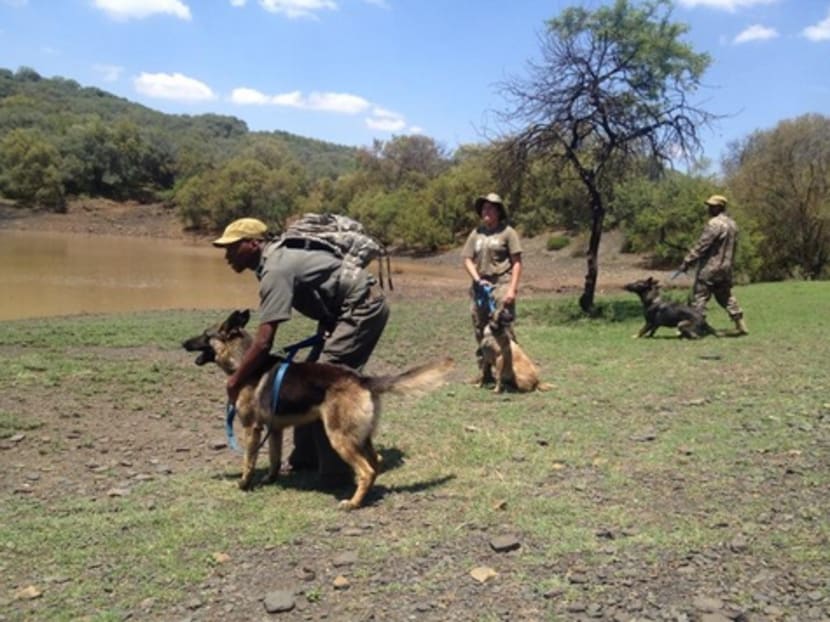South African academy trains anti-poaching dogs
RUSTENBURG — Venom and Killer. These are members of a furry breed of anti-poaching operatives, dogs that can detect a whiff of hidden rhino horn in a suspect’s vehicle or follow the spoor of armed poachers in South Africa’s besieged wildlife parks.
RUSTENBURG — Venom and Killer. These are members of a furry breed of anti-poaching operatives, dogs that can detect a whiff of hidden rhino horn in a suspect’s vehicle or follow the spoor of armed poachers in South Africa’s besieged wildlife parks.
Dogs are a small part of an increasingly desperate struggle to curb poaching in Africa, where tens of thousands of elephants have been slaughtered in recent years to meet a surging appetite for ivory in Asia, primarily China. In South Africa, poachers have killed more than 1,000 rhinos this year, surpassing the 2013 record. Countries and conservationists are trying more robust patrols and surveillance, community programs and other tactics against criminal gangs that sometimes benefit from official corruption.
As the conflict rages, elite dogs and handlers are drilling at an anti-poaching academy northwest of Johannesburg. The course prepares K9 units to find firearms or contraband, track suspects in the undergrowth and abseil in harnesses from helicopters in pursuit of poachers. Dogs and handlers learn to trust each other and fine tune a relationship balancing control and aggression.
“One needs to be the dominant male. Hopefully, it’s the guy and not the dog,’’ said Mr Marius van Heerden, a 28-year-old handler who lives, works and sleeps with Venom, a Belgian Malinois whose breed is known for endurance and athleticism and has been used by the US military in Iraq and Afghanistan. Venom probably got his name from biting trainers as a puppy, Mr van Heerden said.
South Africa-based Paramount Group, which makes military vehicles and other equipment, runs the academy, which has about 50 adult dogs and the same number of puppies. Most are Belgian Malinois and German Shepherds.
Mr Henry Holsthyzen, an academy leader, trained a Belgian Malinois called Killer who has been credited with anti-poaching successes in South Africa’s Kruger National Park. Some 400 canine units are needed for the country’s wildlife parks, but only about 30 are operational, he said.
On a recent afternoon, several rangers from the central African country of Gabon lunged at each other in combat exercises at the academy.
“We need to focus our efforts where the need is greatest,” said Paramount chairman Ivor Ichikowitz, citing the slaughter of much of Gabon’s elephant population. He said poaching was more than a conservation issue because it funds insurgencies and other illegal activities across Africa.
Rhino horn fetches enormous sums on the illegal market. It is made of keratin, a substance also found in human fingernails. Some people covet it as a status symbol and a healing agent despite a lack of evidence that it can cure.
Mr Conraad de Rosner, who runs another anti-poaching group called K9 Conservation, said poachers now worry about dogs. One poacher was caught with chili pepper, which he apparently thought would throw pursuing dogs off his scent, and rangers are concerned that poachers might try to poison dogs with contaminated meat, he said.
However, Mr de Rosner said handlers were careful about letting dogs attack suspects with potentially lethal force, saying: “We are very reticent to release a dog to bite a suspect, just because of all the legal ramifications thereafter.”
Conservationists are using dogs elsewhere in Africa.
The Ol Pejeta Conservancy in Kenya has Belgian Malinois dogs that are a “piece of the jigsaw puzzle” of anti-poaching tactics but are not “a silver bullet”, said Mr Richard Vigne, the conservancy’s chief executive officer. At the Odzala-Kokoua National Park in Congo, two Belgian Malinois were deployed in a successful trial to detect ivory and illegally obtained wildlife meat in bags and suitcases, according to African Parks, a Johannesburg-based group that jointly runs the park with the Congolese government.
The bond between dog and ranger is vital, said Mr Holsthyzen, the South African trainer, recalling a student’s mistake.
“He gave his dog to someone else to go and put in the kennels,” Holsthyzen said. “And my immediate question was, `Would you have another person sleep with your wife?’” AP







